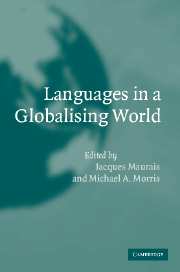Book contents
- Frontmatter
- Contents
- List of figures
- List of tables
- Notes on contributors
- Acknowledgements
- 1 Introduction
- Part I Global communication challenges
- Part II Major areas
- 7 Language geostrategy in eastern and central Europe: Assessment and perspectives
- 8 Languages and supranationality in Europe: The linguistic influence of the European Union
- 9 Regional blocs as a barrier against English hegemony? The language policy of Mercosur in South America
- 10 Effects of North American integration on linguistic diversity
- 11 Sociolinguistic changes in transformed Central Asian societies
- 12 Language and script in Japan and other East Asian countries: Between insularity and technology
- 13 Sub-Saharan Africa
- 14 Australasia and the South Pacific
- Part III Languages of wider communication
- Conclusion
- Index
8 - Languages and supranationality in Europe: The linguistic influence of the European Union
Published online by Cambridge University Press: 18 November 2009
- Frontmatter
- Contents
- List of figures
- List of tables
- Notes on contributors
- Acknowledgements
- 1 Introduction
- Part I Global communication challenges
- Part II Major areas
- 7 Language geostrategy in eastern and central Europe: Assessment and perspectives
- 8 Languages and supranationality in Europe: The linguistic influence of the European Union
- 9 Regional blocs as a barrier against English hegemony? The language policy of Mercosur in South America
- 10 Effects of North American integration on linguistic diversity
- 11 Sociolinguistic changes in transformed Central Asian societies
- 12 Language and script in Japan and other East Asian countries: Between insularity and technology
- 13 Sub-Saharan Africa
- 14 Australasia and the South Pacific
- Part III Languages of wider communication
- Conclusion
- Index
Summary
European Union and supranationality
Economic integration
During the nineteenth and twentieth centuries, national economies in Europe were closely interlinked with nation-states. The borders of these countries protected their economies and, for the strongest of them, their colonial and postcolonial policies opened up markets for their products and services. The process of internationalisation and globalisation deeply transformed relations between the states and the economy. The creation of a European Community (and since 1993 of a Union) accelerated this transformation. Since the Treaty of Rome in 1957 it has consisted in opening an area for the free movement of capital, goods, services and people by creating a common, and later a single, market. The Community was first made up of six countries (Belgium, France, Germany, Italy, Luxembourg and the Netherlands), plus Denmark, Ireland and the United Kingdom in 1973, Spain, Greece and Portugal in 1984 and, as the European Union, incorporated Austria, Finland and Sweden in 1995. Others, such as Hungary, Poland, the Czech Republic, will join them in the near future. In regulating the relations between this market and the different countries EU legislation is followed and laws of the individual states have to conform to it. This legislation is the basis of supranationality. Community institutions are its instruments. The European Commission implements measures and objectives defined by the treaties, proposes programmes and monitors them when adopted. Proposals made by the Commission have to be approved by the states in the European Council, which brings together their representatives.
- Type
- Chapter
- Information
- Languages in a Globalising World , pp. 99 - 110Publisher: Cambridge University PressPrint publication year: 2003
- 14
- Cited by

